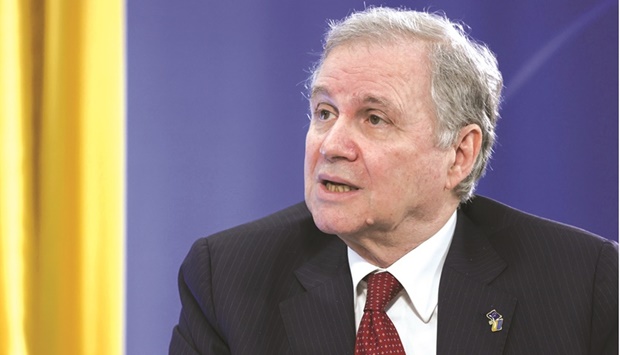The European Central Bank (ECB) might be ready to increase interest rates for the first time in more than a decade in July, Governing Council member Ignazio Visco said.
“We can move gradually, raising interest rates in the coming months,” Visco said in an interview with Bloomberg Television on Friday. While June is too early as that is when the ECB will end net bond purchases, “we will move after that - after that, means perhaps July.”
ECB officials have grown increasingly alarmed about record inflation, with consensus building to start raising borrowing costs in July. Visco, who heads Italy’s central bank, is considered one of the more dovish Governing Council members.
“Now I think that we can move out of this negative territory,” Visco said, referring to the deposit rate, which has been below zero since 2014. “Gradual means in my view that we have to understand that we should move without creating uncertainty in the market.”
Money-market wagers on ECB policy tightening were broadly steady, pricing 34 basis points of rate hikes by July and four quarter-point increases by year-end.
“I have no problem with exiting, but I think it needs to be more gradual than what some may be thinking,” Visco told reporters after the end of the G7 meeting.
With most major global central banks already lifting borrowing costs, even more dovish ECB officials like Spain’s Pablo Hernandez de Cos have said that a first hike should happen shortly after net bond-buying ends early in the third quarter.
Bundesbank President Joachim Nagel reiterated on Friday that a first rate hike could happen in July, citing the need to ensure current price pressures don’t become entrenched. He said further increases “could follow shortly thereafter.”
Euro-zone inflation was 7.4% from a year ago last month, holding at an all-time high, data released this week showed. Visco warned against policy decisions that could lead to price spirals, in remarks to reporters. “We saw in the 1980s that a race between prices and salaries is not helpful,” he said.
The “single most critical factor” for monetary policy now is inflation expectations, because letting them get out of control would be “very damaging,” Governing Council member Olli Rehn said on Wednesday.
Becoming the first Governing Council member to do so, Visco’s Dutch colleague, Klaas Knot, this week floated the idea of lifting rates by a half-point if inflation data worsen.
Analysts polled by Bloomberg expect a first increase of only half that magnitude. The deposit rate - currently -0.5% - will, however, rise above zero this year, they said, aligning their views with the increased sense of urgency among ECB officials.
“Obviously there have been many voices in the last few weeks and I try to refrain from intervening too much,” Visco said on the sidelines of the G-7 finance chiefs meeting near Bonn. “But I think we should consider very carefully what we should do on the basis not only of the data but also” of a careful analysis of what’s to come.
Complicating policy makers’ task is an uncertain economic backdrop that includes the risk of 1970s-style stagflation. The war and China’s Covid Zero strategy are straining supply chains, while business and household confidence has been hit by soaring prices and Russia’s invasion.
Highlighting the focus on prices, however, Estonian Governing Council member Madis Muller said earlier Friday that policy makers must act to combat inflation, while his Latvian colleague Martins Kazaks said he hopes the first rate hike will come in July.

Ignazio Visco, ECB Governing Council member.
